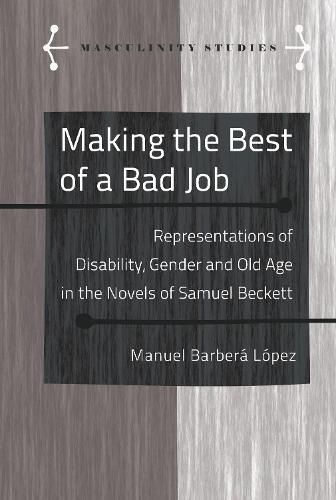Readings Newsletter
Become a Readings Member to make your shopping experience even easier.
Sign in or sign up for free!
You’re not far away from qualifying for FREE standard shipping within Australia
You’ve qualified for FREE standard shipping within Australia
The cart is loading…






This title is printed to order. This book may have been self-published. If so, we cannot guarantee the quality of the content. In the main most books will have gone through the editing process however some may not. We therefore suggest that you be aware of this before ordering this book. If in doubt check either the author or publisher’s details as we are unable to accept any returns unless they are faulty. Please contact us if you have any questions.
This book explores the representations of disability, gender and old age in the novels of Samuel Beckett. His works go against the foundations of Western thought, which has been traditionally focused on success, clarity, learning and ability, while Beckett chose to focus on failure, confusion, decay and impotence. This study purports to show the central importance of the three categories chosen for the general understanding of the writer’s work. It constitutes an attempt to provide a gendered interpretation of Beckett’s protagonists, who are increasingly unable to reason, talk or move properly, extremely old and do not fit hegemonic models of masculinity. Beckett, who denies his own ability as an author to understand and explain a chaotic world, chooses these disabled, old men as the ultimate representatives of the human condition and the best models to transmit his worldview. This is a book combining different perspectives and getting to conclusions regarding power structures which are particularly interesting for researchers or students taking courses on the dialectics of alterity, masculinities studies or new readings of Samuel Beckett’s works. The author’s research is based on the main arguments of feminist thought, masculinities studies, disability studies, ageing studies and recent work on Beckett. The ultimate goal of such interdisciplinary approach is to show how different systems of oppression work in similar ways and to draw the political implications of Beckett’s literary choices, in terms of visibility and solidarity.
$9.00 standard shipping within Australia
FREE standard shipping within Australia for orders over $100.00
Express & International shipping calculated at checkout
This title is printed to order. This book may have been self-published. If so, we cannot guarantee the quality of the content. In the main most books will have gone through the editing process however some may not. We therefore suggest that you be aware of this before ordering this book. If in doubt check either the author or publisher’s details as we are unable to accept any returns unless they are faulty. Please contact us if you have any questions.
This book explores the representations of disability, gender and old age in the novels of Samuel Beckett. His works go against the foundations of Western thought, which has been traditionally focused on success, clarity, learning and ability, while Beckett chose to focus on failure, confusion, decay and impotence. This study purports to show the central importance of the three categories chosen for the general understanding of the writer’s work. It constitutes an attempt to provide a gendered interpretation of Beckett’s protagonists, who are increasingly unable to reason, talk or move properly, extremely old and do not fit hegemonic models of masculinity. Beckett, who denies his own ability as an author to understand and explain a chaotic world, chooses these disabled, old men as the ultimate representatives of the human condition and the best models to transmit his worldview. This is a book combining different perspectives and getting to conclusions regarding power structures which are particularly interesting for researchers or students taking courses on the dialectics of alterity, masculinities studies or new readings of Samuel Beckett’s works. The author’s research is based on the main arguments of feminist thought, masculinities studies, disability studies, ageing studies and recent work on Beckett. The ultimate goal of such interdisciplinary approach is to show how different systems of oppression work in similar ways and to draw the political implications of Beckett’s literary choices, in terms of visibility and solidarity.